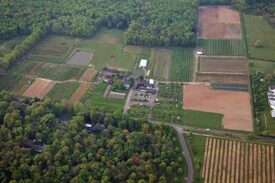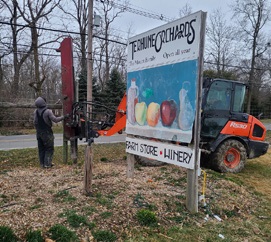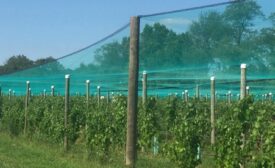by Gary Mount
The thing about farming is that you never know what is coming. Farmers have ideas of what results they want but if the farmer has been at it for a while — in my case 50 years — the word “expect” is not used.

Diversity of fam aerial view
Some of the crops we grow are permanent plantings — trees and bushes. They have been cared for since the end of the last harvest. The nutritional status of the plant and soil have been evaluated, including some work that goes back to the last growing season. For example, we take leaf and petiole samples to be submitted to a testing lab — we like Waypoint Analytical in Memphis, TN. Petioles are the stems of the leaves — leaf and petiole analysis is a good way to know how the plant is doing. We also analyze the soil on the farm. I sometimes get asked, “where should the soil test be done?” That’s not so hard — just test the soil where the roots are and that’s usually underneath the leaves of that plant and with a fruit tree it is underneath the leaves of the tree. Testing right near the trunk of a tree is not as helpful.

Fence post pounding: Installing new fence at the main farm
We also get our hopes up by pruning each tree and bush every year. That is about 40,000 trees, bushes and vines. All that I’ve written above does not in any way indicate that we have not been planning for our annual crops. Our daughter Reuwai recently added up what she purchases each year — about 304 different varieties of fruits and vegetables. Some are trees and bushes and vines but there are also over 140 annual types to be purchased and planted. Just think of it — 17 types of tomatoes, 19 types of herbs, and so on. Soils are tested for about 20 different qualities. Each field is different so separate tests are required and then just before planting time (spring time), the test results must be reviewed and choices must be made. What should be done with all that information and meanwhile, please don’t forget to think about how the crop did in that field the previous year. For the annual crops it is a two-part process. #1 — what gets planted where, and #2 — what can we best do to prepare the soil. The most amazing part of all this testing reviewing and deciding is that all farmers do it every year!
Maybe it’s getting clearer why I call the springtime and early summer — the hopeful time of year. But we are not done. All that I have written about above is just to get started. The preparation is very important, but what is done on the farm in the summer is not automatic. The resulting production of fruits and vegetables also depends on what is done during the growing season.

Bird net over wine grapes
First is beating the competition. I’m not talking about other farmers — I mean the weeds, insects, diseases, animals, and birds that compete with us for what we grow. Weeds are the worst! It is often said by farmers that if only crops could grow as well as weeds — such competition! Many of our crops are certified organic which means no herbicides are used to control weeds. Instead, much use is made of the “Armstrong method” (get it?). Insects and diseases compete for our crops and we depend on weekly visits by Rutgers University specialists to give us advice. Then there are the birds — they just eat the whole crop. Blueberries, blackberries, cherries, grapes, and melons. Our best defense (and most expensive) is netting to exclude the birds. Last on the list are deer. They are especially bad because they eat all year long. Each of our five farms is fenced to keep them out. As wife Pam says, it has a penitentiary type of appearance around here but we just have to keep the deer out.
Once seeds are planted and once trees and bushes are growing and once a campaign against the competition is underway there is the matter of keeping the crop growing. That means water! I have looked back at the Terhune Orchards News from the past and have seen how many times I have written about water. I can’t believe it. It’s almost as if I do not know that New Jersey is blessed with normally adequate rainfall but what gets my attention the most is the times when there is not enough water. Farmers call these times “dry spells”. Unfortunately, a long dry spell can cancel out all that preparation done on the farm. Here at Terhune, we have enough supplemental water. We call it irrigation. All that’s needed is the work to turn it on and keep it going — not totally easy, but very needed.
All in all … we’re hopeful. No guarantees and no expectations are involved. We are lucky to do what we do, and we love it. It’s a hopeful time of year!
